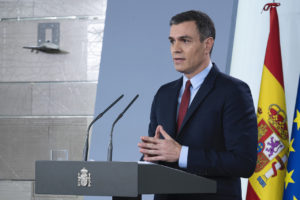
The 15-day “State of Alarm” decreed by the Spanish government on the weekend makes it clear that people should stay at home except for absolutely essential circumstances.
These include going out to buy food, pharmaceutical products or petrol, receiving medical attention, visiting ill or vulnerable family members, and – if “remote working” is not a valid option – going to work.
Those who have to leave home are advised to avoid public transport if possible and, walk or drive alone (unless assisting someone with mobility issues), while being careful to maintain a one-metre distance from other people.
Police will be posted in strategic locations to ensure these “confinamiento” (lockdown) restrictions are enforced. Anyone disobeying or resisting police officers’ instructions can face penalties of between €100 and one year in prison.
As for air travel, many services to and from Spanish airports such as Málaga-Costa del Sol have been drastically reduced, although operations have not been completely suspended.
For UK travellers, the Foreign and Commonwealth Office has updated its official travel advice to recommend “against all but essential travel to Spain” (see below).
Spanish Lockdown
After a marathon seven-hour cabinet meeting, Spanish Prime Minister Pedro Sánchez addressed the nation on Saturday night to outline the conditions and implications of the lockdown.
A “State of Alarm” (also translated as “State of Alert”) has only been decreed on one other occasion since Spain returned to constitutional democracy in 1978: in 2010, after air-traffic controllers called a strike that caused widespread travel chaos.
Also on this occasion, restrictions have been imposed under Article 116 of the Spanish Constitution, which covers three legal categories for emergency situations: “State of Alarm”, “State of Emergency” and “State of Siege” (“Estado de Alarma”, “Estado de Excepción” and “Estado de Sitio”, respectively).
The lowest level of these categories, “Estado de Alarma”, was approved by the Cabinet, to last for 15 days from Sunday 15 March before it would need to be extended by parliamentary approval.

“As you know,” said Sánchez (whose wife Begoña Gómez has tested positive for COVID-19, as well as two cabinet ministers and other political leaders), “Spain is facing a public health emergency that requires extraordinary decisions. This is a global pandemic that is damaging for citizens as a whole.”
He said all of Spain’s police forces would be under the direct orders of the interior ministry, and the government would also have the armed forces at its disposal.
Travel across Spain was restricted from Saturday night, and most retail activity has been suspended, with people only permitted to leave their homes for such crucial necessities as food purchases, pharmacies, health centres, banks and petrol stations, as well as going to work if required or returning to their primary residence.
Within the education system, classes are suspended at all levels, including universities, although online education activities are being maintained.
Citizens’ physical presence in commercial outlets should be limited to what is strictly necessary, large crowds must be avoided, and customers and employees are required to maintain a one-metre distance to help reduce the risk of contagion.
Bars and restaurants are only allowed to make home deliveries, and all museums, galleries and other cultural venues, plus sports clubs and amenities, are obliged to remain closed.
Sánchez also stressed that the national health ministry would have the power to ensure the correct functioning of food production centres and distribution chains, even to the extent of accompanying transport vehicles and prioritising customs procedures for essential products.
Transport services, both public and private, will be reduced to at least half during the 15-day period, apart from local rail networks (“Cercanías”). Passenger transport vehicles will be subject to daily cleansing procedures as stipulated by the health ministry.
The prime minister concluded by calling on people to help the most vulnerable in society, especially the elderly, and thanked all those making a valuable contribution to fighting the virus, including health staff, police, the armed forces and scientific researchers.
Government Advice for UK Travellers
In its latest official statement on Spain and the country’s measures to combat the coronavirus outbreak, the Foreign and Commonwealth Office reported, “We keep our travel advice under constant review and recommend that British nationals sign up for alerts, so they know when it has been updated.
“Anyone with upcoming journeys planned should check with their airlines and tour operators for the latest information. Wherever you are in Spain, you should follow the instructions of the local authorities.”
British Ambassador to Spain Hugh Elliott recorded a video message for UK nationals explaining the implications for both residents and tourists. He also thanked the Spanish authorities, “in particular the healthcare professionals, for all the great work they are doing to help keep everyone in Spain – of all nationalities – safe, in circumstances that are very challenging indeed.”
Useful Information and Contacts
Travel advice: Foreign and Commonwealth Office (FCO)
Returning from overseas: UK Department of Health and Social Care
Spanish government information: Ministry of Health
Flight information: Málaga-Costa del Sol Airport
